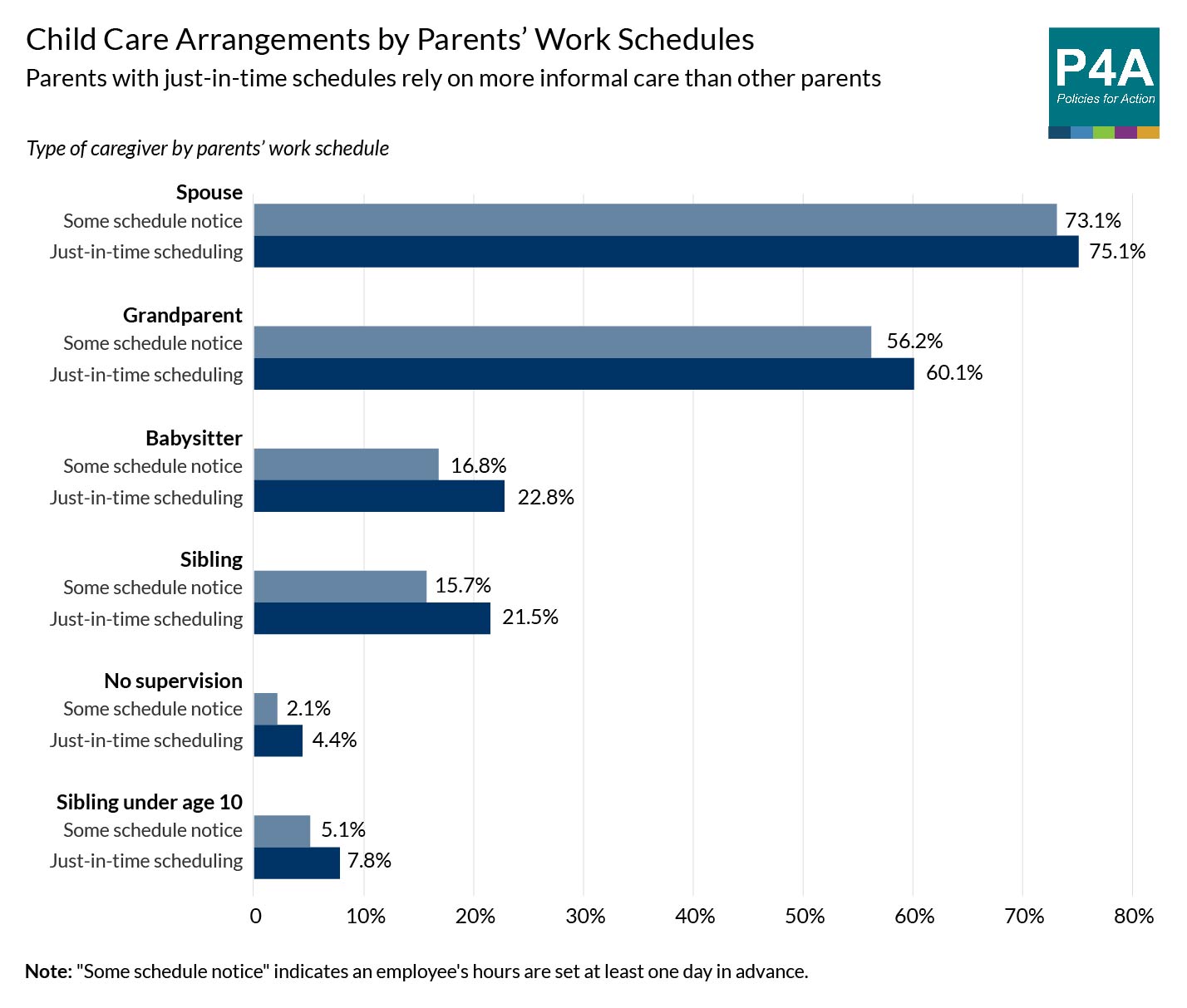Why Making Parents’ Work Schedules More Predictable Could Benefit Kids
|
As shoppers prepare for the holidays with trips to the mall, supermarket, and big box stores, many workers who stock the shelves and work the registers are scrambling to piece together child care to match their unpredictable work schedules.
Such schedules are an everyday reality in the food and retail sectors, where employers aim to lower labor costs by closely aligning staffing with demand. Consequently, workers frequently have shifts changed, canceled, or added at the last minute. These just-in-time scheduling practices provide flexibility for employers, who can call in extra workers when a store is busy or send workers home if business is slow. But these practices offer workers little notice of when they will be expected to work, making it difficult for workers to plan for other aspects of their lives.
Unpredictable scheduling practices may get even more extreme during the holiday shopping season as employers face uncertainty about customer traffic in an era of growing e-commerce. As our research and new working paper explore, these just-in-time scheduling practices can affect parents’ abilities to find the best child care arrangements for their kids.
How just-in-time scheduling practices are linked to child care arrangements
One in 10, or 7 million, kids under 18 in the US has a parent employed in the retail or food service sectors and could be affected by the unpredictability of parental work schedules.
Work schedules play a central role in enabling or precluding particular types of child care. Research has found that nonstandard work hours, such as night shifts, are often incompatible with the hours of most formal child care centers. But less research has focused on how the instability created by just-in-time scheduling practices affects child care arrangements.
Using new data from the Shift Project on 3,653 working parents in the retail and food service sectors, we show that unstable work schedules in the service sector matter for children’s care settings.
We focus on two types of just-in-time scheduling: on-call shifts, in which workers must be prepared to come to work if asked, and last-minute changes to work schedules, such as earlier or later starting or stopping times.
We find that a large share of working parents in the service sector work these types of schedules. Nearly 28 percent of parents in the sample reported being asked to work on call, and almost 70 percent reported a last-minute schedule change in the past month.
We then compared working parents who experienced these just-in-time scheduling practices with those who did not. We find that on-call work and last-minute shift changes are associated with more numerous care arrangements, with greater reliance on informal care arrangements, such as babysitters and siblings, and leaving children without care from a mature caregiver.
Child Care Arrangements by Parents’ Work Schedules
 Child care arrangements play an important role in child development and well-being. The types of child care associated with just-in-time scheduling—including numerous arrangements, informal care, sibling care, and self-care—are all known to negatively affect children. Numerous care arrangements can interrupt the formation of routines and impede the development of secure attachments with caregivers, while sibling care and self-care raise the risk of injury and accidents. Though informal providers may offer greater flexibility to parents, they are also more variable in quality and lower quality on average compared to formal center-based care.
Child care arrangements play an important role in child development and well-being. The types of child care associated with just-in-time scheduling—including numerous arrangements, informal care, sibling care, and self-care—are all known to negatively affect children. Numerous care arrangements can interrupt the formation of routines and impede the development of secure attachments with caregivers, while sibling care and self-care raise the risk of injury and accidents. Though informal providers may offer greater flexibility to parents, they are also more variable in quality and lower quality on average compared to formal center-based care.
Efforts to give parents more schedule stability could benefit their children
Though these practices remain widespread, several cities and states, including San Francisco, Seattle, New York City, Philadelphia, Chicago, and Oregon, have passed laws over the past four years that regulate and restrict on-call work and last-minute shift changes. Some employers have also voluntarily pledged to offer more stability by eliminating on-call shifts and offering at least two weeks’ notice of workers’ schedules.
Legislation and voluntary company commitments that increase the predictability and stability of work schedules will affect not only workers but their children, too. Providing working parents with more advanced notice of their schedules and restricting last-minute shift changes allows workers, children, and caregivers to experience greater stability and ensures kids are getting the care they need for strong development and well-being.
Related Projects
-
September 15, 2016
|Has Evidence
| -
Mental and Behavioral HealthCalifornia Diversion: Mental Health, Racial Equity, and Criminal Court
September 1, 2021
|Has Evidence
| -
Community Justice and Public SafetyAre Cities and Counties Ready to Use Racial Equity Tools to Influence Policy?
December 15, 2018
|